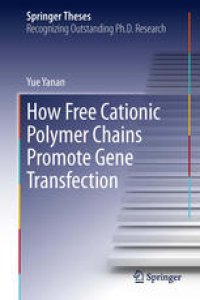
Ebook: How Free Cationic Polymer Chains Promote Gene Transfection
Author: Yue Yanan (auth.)
- Tags: Polymer Sciences, Organic Chemistry, Nucleic Acid Chemistry
- Series: Springer Theses
- Year: 2013
- Publisher: Springer International Publishing
- Edition: 1
- Language: English
- pdf
In this PhD thesis, Yue Yanan addresses a long-overlooked and critical question in the development of non-viral vectors for gene delivery. The author determines that those uncomplexed and cationic polymer chains free in the solution mixture of polymer and DNA facilitate and promote gene transfection. Furthermore, by using a combination of synthetic chemistry, polymer physics and molecular biology, Yue confirms that it is those cationic polymer chains free in the solution mixture, rather than those bound to DNA chains, that play a decisive role in intracellular trafficking. Instead of the previously proposed and widely accepted “proton sponge” model, the author's group propose a new hypothesis based on the results of several well-designed and decisive experiments. These results show that free polycationic chains with a length of more than ~10 nm are able to partially block the fusion between different endocytic vesicles, including the endocytic-vesicle-to-endolysosome pathway. This thesis is highly original and its results greatly deepen our understanding of polymer-mediated gene transfection. More importantly, it provides new insights into the rational design of next-generation superior polymeric gene-delivery vectors.
In this PhD thesis, Yue Yanan addresses a long-overlooked and critical question in the development of non-viral vectors for gene delivery. The author determines that those uncomplexed and cationic polymer chains free in the solution mixture of polymer and DNA facilitate and promote gene transfection. Furthermore, by using a combination of synthetic chemistry, polymer physics and molecular biology, Yue confirms that it is those cationic polymer chains free in the solution mixture, rather than those bound to DNA chains, that play a decisive role in intracellular trafficking. Instead of the previously proposed and widely accepted “proton sponge” model, the author's group propose a new hypothesis based on the results of several well-designed and decisive experiments. These results show that free polycationic chains with a length of more than ~10 nm are able to partially block the fusion between different endocytic vesicles, including the endocytic-vesicle-to-endolysosome pathway. This thesis is highly original and its results greatly deepen our understanding of polymer-mediated gene transfection. More importantly, it provides new insights into the rational design of next-generation superior polymeric gene-delivery vectors.
In this PhD thesis, Yue Yanan addresses a long-overlooked and critical question in the development of non-viral vectors for gene delivery. The author determines that those uncomplexed and cationic polymer chains free in the solution mixture of polymer and DNA facilitate and promote gene transfection. Furthermore, by using a combination of synthetic chemistry, polymer physics and molecular biology, Yue confirms that it is those cationic polymer chains free in the solution mixture, rather than those bound to DNA chains, that play a decisive role in intracellular trafficking. Instead of the previously proposed and widely accepted “proton sponge” model, the author's group propose a new hypothesis based on the results of several well-designed and decisive experiments. These results show that free polycationic chains with a length of more than ~10 nm are able to partially block the fusion between different endocytic vesicles, including the endocytic-vesicle-to-endolysosome pathway. This thesis is highly original and its results greatly deepen our understanding of polymer-mediated gene transfection. More importantly, it provides new insights into the rational design of next-generation superior polymeric gene-delivery vectors.
Content:
Front Matter....Pages i-xviii
Introduction and Background....Pages 1-27
Revisiting Complexation Between DNA and Polyethylenimine: The Effect of Uncomplexed Chains Free in the Solution Mixture on Gene Transfection....Pages 29-48
Revisiting Complexation Between DNA and Polyethylenimine: The Effect of Length of Free Polycationic Chains on Gene Transfection....Pages 49-72
Quantitative Comparison of Endocytosis and Intracellular Trafficking of DNA/Polymer Complexes in the Absence/Presence of Free Polycationic Chains....Pages 73-94
In this PhD thesis, Yue Yanan addresses a long-overlooked and critical question in the development of non-viral vectors for gene delivery. The author determines that those uncomplexed and cationic polymer chains free in the solution mixture of polymer and DNA facilitate and promote gene transfection. Furthermore, by using a combination of synthetic chemistry, polymer physics and molecular biology, Yue confirms that it is those cationic polymer chains free in the solution mixture, rather than those bound to DNA chains, that play a decisive role in intracellular trafficking. Instead of the previously proposed and widely accepted “proton sponge” model, the author's group propose a new hypothesis based on the results of several well-designed and decisive experiments. These results show that free polycationic chains with a length of more than ~10 nm are able to partially block the fusion between different endocytic vesicles, including the endocytic-vesicle-to-endolysosome pathway. This thesis is highly original and its results greatly deepen our understanding of polymer-mediated gene transfection. More importantly, it provides new insights into the rational design of next-generation superior polymeric gene-delivery vectors.
Content:
Front Matter....Pages i-xviii
Introduction and Background....Pages 1-27
Revisiting Complexation Between DNA and Polyethylenimine: The Effect of Uncomplexed Chains Free in the Solution Mixture on Gene Transfection....Pages 29-48
Revisiting Complexation Between DNA and Polyethylenimine: The Effect of Length of Free Polycationic Chains on Gene Transfection....Pages 49-72
Quantitative Comparison of Endocytosis and Intracellular Trafficking of DNA/Polymer Complexes in the Absence/Presence of Free Polycationic Chains....Pages 73-94
....